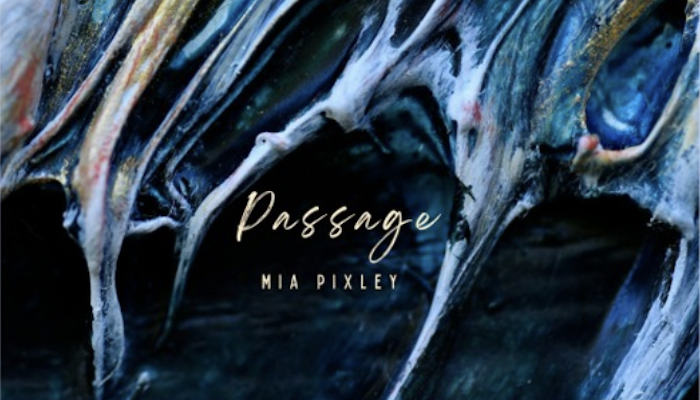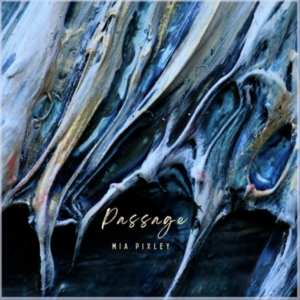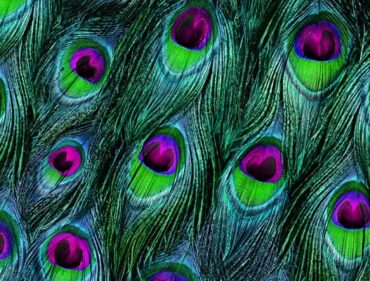Special Announcement: Mia Pixley’s Passage
Introduction by Mia Pixley, Ph.D.
Editors’ Note: Mia Pixley is a licensed clinical psychologist, as well as cellist and composer. You can learn more about Mia on her website, miapixley.com. Also, you can listen to her interview on the Sacred Stream Radio Podcast where she speaks with Laura Chandler about her latest album, parenting, nature, and the human psyche. Listen to this episode anywhere you get your podcasts or stream it on our website.
Passage is an interdisciplinary call and response poetry, music, and prose project inspired by grief and created at the height of the pandemic. The project hinges around a single poem written by poet, scholar, and psychoanalyst, Forrest Hamer, Ph.D. Dr. Hamer sent me, a practicing psychologist, cellist, vocalist and composer, his poem, Passage, after I had asked if he had any poems about the ocean – the greatest destroyer, life-giver, and in many ways, teacher of loss. Held by his words, Hamer’s poem spoke deeply to my feelings of grief. And I was inspired to create a series of musical pieces from his single poem. Afterwards, I shared the music with him. He was, in turn, touched.
Moved by this experience, I wondered if others would like to feel held in their grief via art and art making. I decided to invite four psychotherapy colleagues to listen to the project and share their isolated written responses with me. Without their knowing what the others had written, my colleagues’ responses fit perfectly together. It was as if they had been in deep communion with one another across the whole process. Thus, Passage, while inspired by my singular experience of grief, became an unintentional demonstration of the universality of loss and the power of art making as a healing practice. The preceding materials contain each piece of this interdisciplinary work, including my colleagues’ responses. I offer them as an invitation for others to create from and to feel communion with what challengingly and ineffably unites us.
Passage – a poem by Forrest Hamer, Ph.D.
I was sitting on waves in the middle of a rocking
ocean, and I looked as far as
I could see in many directions
and all there was, was sky.
And I sent myself into each noticed thing—
the ocean, and its rocking,
the waves, the distances, the sky.
I did this to make myself whole.
I did this to survive.
what otherwise would sink me.
Music by Mia Pixley, Ph.D.
Artwork by Fariba Bogzarn, Ph.D.
Possibility – Natalie Hung, Ph.D.
I was a child born into pain. Swirling around me, unbidden and unseen, tied up in knots and full of energy and spikes and quicksand and monsters and secrets. But I didn’t know. I thought it was just me. I thought it was my fault. And I dwelt in this well of shame, broken-hearted, and got very comfortable.
But people told me: “It’s not just you. There’s more out there—there is the sky and breath and air to sustain you.” And eventually, a part of me believed it. As the sunlight warmed my skin, I started to see where I stopped, and the anguish began. I began to see the contours of the hurt. Some of it didn’t belong to me. So, I gave it a loving kiss goodbye and returned it to my family, to Society, to unseen forces, to ancestors.
What was left was mine alone. I tended to it, embraced it, and asked others to help me carry it. And then I released as much as I could into the big sky and the beautiful crying earth, sent it howling into the ocean, sculpted it into something gorgeous or interesting. I drowned a little and cried a lot. And the shapes of my body, the gifts of my ancestors, the light of the stars, what is lost in me, and what is found in you all came back into my heart and showed me how to live.
Part of my work with people who decide to participate in therapy is to attempt to learn what lives in their bodies. We talk in sessions about their lived experiences past and current, their hopes for the future. We explore thoughts and feelings and ideas. The messages, the speaking, that happens inside my body, and between us both are not just part of us alone but connected to a vast landscape of things. If I can hold onto the spaces that are part of mysteries without words, then my body can be part of our meeting, then their body can be invited too, by my own awareness, into the meetings. Then we get to sit with not only each other, but something that I can only think of as spirit- a non-dogmatic fierce and compassionate companion that walks with us whether we like it or know it or not; as we try to understand, find meaning, and survive on this planet. A collective of all of our lives and deaths where time does not exist. Being a human on this earth is its own cultural experience.
From where does this passion of mine arise?
Dredged from my love, my sorrow. My sorrow most especially.
A village of experience carried up from the roots.
And what is this alchemy?
Surely, not so much a moving past so much as a passing through.
Binding me, becoming me, and me becoming it.
But what if I dig deeper, beyond this insistence on “me?”
As I look across the ocean plane, I hear them calling. At first faintly,
Then unmistakably. Swirling through the centuries.
Diaphanous ribbons of smoke.
Something is burning!
The voices of African ancestors, calling out across the middle passage,
Fighting with every inch of their being to not succumb.
1.8 million. A number too evil to fathom.
Tumbling into mother’s arms. Just let go.
There is no shame in dying.
They leave with their life force smoldering, smudging the sky with a kiss
For us to see, if we will have them.
Remembering because now we’ve been kissed unforgettably.
A melody emerges. I find myself rocked here in this shapeless past.
Now that I’ve found the dead, I don’t want to ever leave.
But I cannot stay. Snapped back to the story unfolding here.
She calls me back, “my daughter.” She needs a special care,
One which comes from having been touched by bottomless grief.
I look up above the ocean plane and see a string of clouds.
Celestial bodies, like beads of sweat, drawn from the well below.
Those who came before.
They tell me, they are not in pain anymore.
They see beyond the interminable hell
That was the ocean, reflecting its beauty, too profound to fathom.
Magnanimous love, like fingers running through my hair,
Down to my roots which branch upward to kiss the sky.
Beyond hope: On taking chances – Hannah Wallerstein, Ph.D.
1.
I have a patient coming to the end of his life. A hard life. A patient looking forward to nothing; contemplating death and a world full of destruction. I have a patient who experiences unbearable suffering, near constantly. Suffering that nothing seems to move. Who needs a solution now, and who is without a solution. What does one do with these realities? What can one offer? How does one not “sink”?
As I spent time with Hamer’s poem and Pixley’s compositions, I decided that the answer to these questions is not hope. At least not in any simple sense.
2.
Putin invaded Ukraine as I began to write this response. For weeks when I listened to this project, images of the war and Ukrainian resistance came into my mind.
3.
A colleague used to remind me that hope was one of the sins in Pandora’s box. Some are tormented by the weight of it, others are phobic of it. Hope can be mobilizing, but it can also feed complacency. At this moment in time, hope feels inadequate. It seems shallow to anticipate things turning out well, when facing the innumerable catastrophes that populate our past and present realities. This has left me with a question: if not hope, then what?
4.
One answer, is the space of respite. Here the painful reality is not changed or denied, but breaks are taken from its engagement. Hamer’s poem can be read as articulating this process, as the speaker manages the inarticulable horror of the transatlantic slave trade by “sett[ing him]…self into each noticed thing”, finding places to rest beyond the catastrophic.
6.
There is also the space provided by aesthetic transformation. Much has been said about how art allows for psychic survival; that art gives form to experience that otherwise would feel infinite, and remains in contact with suffering while moving beyond it. In listening to this project, I became aware that art also marks the presence of a subject (the artist) who has personalized experience, refusing in this way to be overtaken by it.
7.
Then there is the inestimable value of companionship. “[A]ll survivors bear witness to the impossibility of surviving alone,” write Davoine and Gaudilliere about historical trauma. This is another way of hearing Hamer’s “set[ting] myself into each noticed thing”; as not just momentary respite from one’s experience, but an effort at contact with what can be found or imagined, to make experience survivable that would not be so if lived alone.
8.
Beyond each of these elements—respite, transformation, companionship—this project left me with an experience of spaciousness more difficult to articulate. Perhaps it was Pixley’s composition “The Sky,” which evokes for me potential space. Or Hamer’s line “and all there was, was sky,” which simultaneously brings to mind the totalizing negativity of catastrophe and radically free expanse.
One of the images out of Ukraine that has most moved me is of citizens wrapping monuments in protective insulation. Partly, this is due to the depth of care communicated in this act. But it also captures something which has moved so many of us in the reports of Ukrainian resistance; namely, the decision to try. That regardless of the likelihood of success, regardless of the cost, some things are important enough to be worth a shot.
This is another way to read the spaciousness this project offers: the provision of a space for trying; to engage the most horrific aspects of reality, not knowing what the outcome will be. We could even think of respite, aesthetic transformation, and companionship as necessary components to the project of keeping us in the game. It is this openness to what may be possible, and willingness to take the chance, that I have come to think of as the ultimate antidote to both hope and hopelessness.
This is what psychotherapy, at its best, can offer: a commitment not to certain results or to things turning out well, but to holding a space for whatever may occur when two humans attend deeply to the suffering of one of them. This is what I have, and all I have, to offer my patient who is dying, who is suffering: a willingness to work, and the recognition that the consequences of this work cannot be foreseen, and the risks may at times be great, but also that some things are worth a shot; that there is dignity to be found in the act of trying, and the possibility of discovering something new.
ENJOYING THE STREAM OF CONSCIOUSNESS BLOG? SIGN UP FOR FREE UPDATES!




